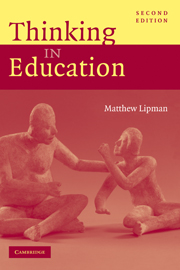Book contents
- Frontmatter
- Contents
- Preface
- Introduction to the Second Edition
- PART ONE EDUCATION FOR THINKING
- 1 The Reflective Model of Educational Practice
- 2 Approaches in Teaching for Thinking
- 3 Obstacles and Misconceptions in Teaching for Thinking
- PART TWO COMMUNITIES OF INQUIRY
- PART THREE ORCHESTRATING THE COMPONENTS
- PART FOUR EDUCATION FOR THE IMPROVEMENT OF THINKING
- Bibliography
- Index
1 - The Reflective Model of Educational Practice
Published online by Cambridge University Press: 05 June 2012
- Frontmatter
- Contents
- Preface
- Introduction to the Second Edition
- PART ONE EDUCATION FOR THINKING
- 1 The Reflective Model of Educational Practice
- 2 Approaches in Teaching for Thinking
- 3 Obstacles and Misconceptions in Teaching for Thinking
- PART TWO COMMUNITIES OF INQUIRY
- PART THREE ORCHESTRATING THE COMPONENTS
- PART FOUR EDUCATION FOR THE IMPROVEMENT OF THINKING
- Bibliography
- Index
Summary
There are three key models of private and public institutions in our society. The family represents institutionalized private values. The state represents institutionalized public values. And the school epitomizes the fusion of the two. As an amalgam of private and public interests, the school is no less important than the distinctively private or the distinctively public. In some ways it is the most important of all, because through it past and present generations deliberately and consciously attempt to stamp a design upon the future. Yet in all three institutions – family, government, and school – practice and policy conflicts abound, for each family and each government administration would like to shape succeeding generations in its own image, but the facts of social change – growth, regression, aimless or orderly drift – conspire to defeat such aspirations.
The school is a battleground because it, more than any other social institution, is the manufacturer of the society of the future, and virtually every social group or faction therefore aspires to control the school for its own ends. Not that this is generally acknowledged. The received opinion has it that the schools reflect the accepted values of their time; they are not to challenge such values or suggest alternatives to them. Many parents shudder at the notion that the schools will take it upon themselves to become initiators of social change, because they fear that this will merely mean that the schools will have been captured by this or that social faction seeking to impress its will upon the world.
- Type
- Chapter
- Information
- Thinking in Education , pp. 9 - 27Publisher: Cambridge University PressPrint publication year: 2003



